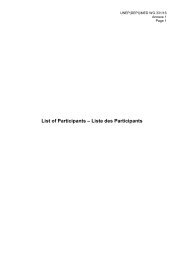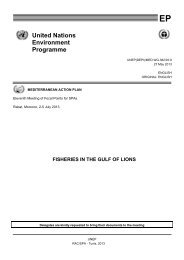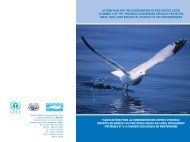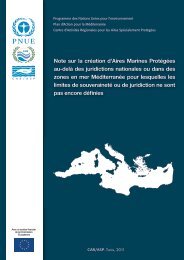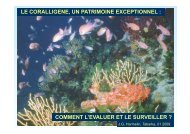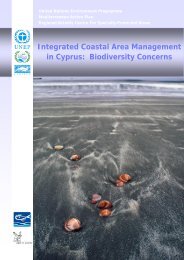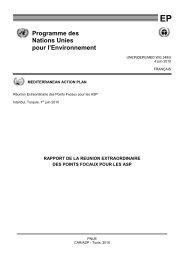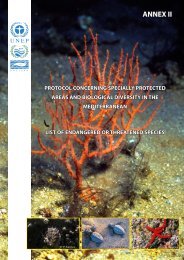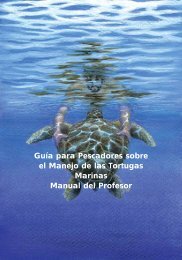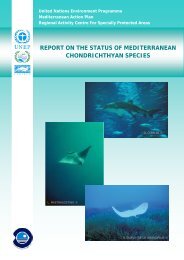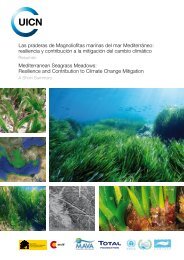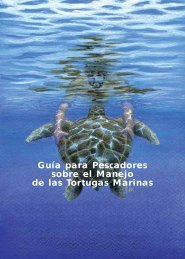Proceedings of the Second Mediterranean Symposium on Marine
Proceedings of the Second Mediterranean Symposium on Marine
Proceedings of the Second Mediterranean Symposium on Marine
You also want an ePaper? Increase the reach of your titles
YUMPU automatically turns print PDFs into web optimized ePapers that Google loves.
PROCEEDINGS OF THE SECOND MEDITERRANEAN SYMPOSIUM ON MARINE VEGETATION (ATHENS, 12-13 DECEMBER 2003)<br />
46<br />
GLOBAL WARMING<br />
Since <str<strong>on</strong>g>the</str<strong>on</strong>g> 1960s or 1970s, both deep and surface <str<strong>on</strong>g>Mediterranean</str<strong>on</strong>g> waters have been<br />
steadily warming up (Béthoux et al., 1990, 1998; Salat and Pascual, 2002). This<br />
warming results from <str<strong>on</strong>g>the</str<strong>on</strong>g> 1 500-year cycle, <str<strong>on</strong>g>the</str<strong>on</strong>g> AMO (Atlantic Multidecadal Oscillati<strong>on</strong>),<br />
<str<strong>on</strong>g>the</str<strong>on</strong>g> NAO (North Atlantic Oscillati<strong>on</strong>) and possibly from <str<strong>on</strong>g>the</str<strong>on</strong>g> greenhouse effect (Bradley,<br />
2000; Kerr, 2000; deMenocal, 2001; deMenocal et al., 2001; Hurrell et al., 2001;<br />
McDermott et al., 2001; Tourre, 2002). Biological indicators, i.e. warm water species,<br />
react to this warming by extending <str<strong>on</strong>g>the</str<strong>on</strong>g>ir range area northwards (Bianchi and Morri, 1993,<br />
1994; Francour et al., 1994). These observati<strong>on</strong>s prompt <str<strong>on</strong>g>the</str<strong>on</strong>g> questi<strong>on</strong>: does this<br />
warming threaten <str<strong>on</strong>g>Mediterranean</str<strong>on</strong>g> macrophytes and ecosystems dominated by<br />
macrophytes?<br />
Fig. 11. Invasi<strong>on</strong> <str<strong>on</strong>g>of</str<strong>on</strong>g> some subtidal and deep <str<strong>on</strong>g>Mediterranean</str<strong>on</strong>g> communities by <str<strong>on</strong>g>the</str<strong>on</strong>g><br />
introduced Caulerpa taxifolia: homogenisati<strong>on</strong> <str<strong>on</strong>g>of</str<strong>on</strong>g> habitats and gamma species diversity<br />
decline.<br />
Some authors have suggested that <str<strong>on</strong>g>the</str<strong>on</strong>g> present day flow <str<strong>on</strong>g>of</str<strong>on</strong>g> introduced species into <str<strong>on</strong>g>the</str<strong>on</strong>g><br />
Mediter-ra-nean may be a c<strong>on</strong>sequence <str<strong>on</strong>g>of</str<strong>on</strong>g> global warming. Although this warming trend<br />
may help tro-pical spe-cies to col<strong>on</strong>ize <str<strong>on</strong>g>the</str<strong>on</strong>g> <str<strong>on</strong>g>Mediterranean</str<strong>on</strong>g>, it is worth emphasizing that<br />
(i) most recently intro-duced macro-phytes originate from temperate areas, mainly NE<br />
Asia (including Japan), via aquaculture, ra<str<strong>on</strong>g>the</str<strong>on</strong>g>r than from tropical areas (Boudouresque<br />
and Verlaque, 2002) and that (ii) Caulerpa taxifolia and C. racemosa var. cylindracea,<br />
two <str<strong>on</strong>g>of</str<strong>on</strong>g> <str<strong>on</strong>g>the</str<strong>on</strong>g> most invasive species in <str<strong>on</strong>g>the</str<strong>on</strong>g> <str<strong>on</strong>g>Mediterranean</str<strong>on</strong>g>, though usually referred to as<br />
"tropical green algae", actually do not originate from tropical waters but from <str<strong>on</strong>g>the</str<strong>on</strong>g><br />
temperate Sou<str<strong>on</strong>g>the</str<strong>on</strong>g>rn Australia (<str<strong>on</strong>g>the</str<strong>on</strong>g> "<str<strong>on</strong>g>Mediterranean</str<strong>on</strong>g>" Australian province) (Jouss<strong>on</strong> et al.,<br />
2000; Meusnier et al., 2001; Verlaque et al., 2003).



